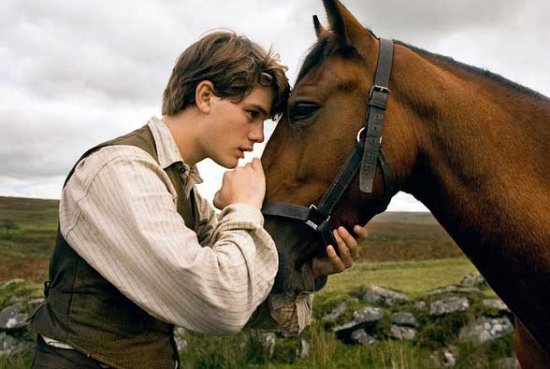
【電影簡介】
當(dāng)?shù)谝淮问澜绱髴?zhàn)剛剛露出即將打響的苗頭的時(shí)候,作為一個(gè)英國的牧場家庭,盡管他們手頭根本就沒有足夠的資金去擁有它,可他們還是在一場拍賣會(huì)上買下了一匹脾氣相當(dāng)狂躁的小馬駒,起名為“喬伊”,這匹馬看起來就好似是一個(gè)不折不扣的失敗的選擇,泰德(彼得·穆蘭 飾)和羅茜·納拉科特(艾米麗·沃森 飾)夫婦對(duì)此都感到非常地失望,他們甚至預(yù)感到,挽救瀕臨倒閉的牧場的愿望就要落空。
但是他們的兒子阿爾伯特(杰瑞米·艾文 飾)卻決定馴服“喬伊”,因?yàn)樗呀?jīng)被這匹馬奔跑的速度、張揚(yáng)的個(gè)性和迷人的靈魂給徹底地征服了——很快,一人一馬就變得形影不離起來,然而隨著戰(zhàn)爭的爆發(fā),他們卻被迫分開了,“喬伊”就在阿爾伯特的眼皮底下被賣掉了,成為了一位英勇的英國騎兵軍官的坐騎,就此走上前線。
可是,離開了阿爾伯特之后,屬于“喬伊”的有如迷宮一樣的旅程也隨之展開,而它在這個(gè)過程中經(jīng)歷的分別是快樂、悲傷、艱難與奇跡,并且伴隨著這些征程迅速地成長起來,從一只單純的坐騎,變成了一位非凡的英雄,用它純真無害的天性、不帶任何雜質(zhì)的動(dòng)機(jī)以及對(duì)自己的人類朋友無條件的奉獻(xiàn),感動(dòng)了來自于這場戰(zhàn)爭的所有對(duì)立面的生命——它不僅拉得動(dòng)戰(zhàn)場上的戰(zhàn)地流動(dòng)醫(yī)院、還知道靈巧地躲避德國士兵的追趕、同時(shí)還在這個(gè)過程中點(diǎn)亮了一位法國女孩的想象力、甚至拉著巨大且沉重的大炮爬上了山頂,在阿爾伯特一路不斷地靠近屬于他自己的危險(xiǎn)任務(wù)的時(shí)候,“喬伊”發(fā)現(xiàn)自己在英軍和德軍之間的“無人地帶”遭到了誘捕,即使這一次看起來沒有任何逃脫的可能性了,可是它還是抓住了和平時(shí)期轉(zhuǎn)瞬即逝的機(jī)會(huì),飛奔進(jìn)回歸和重逢的夢(mèng)想當(dāng)中。
【音頻文本】
The weirdest thing happened when I watched the War Horse. Towards the end of the movie, I heard gentle sobbing and thought it must be some young girl with a heart of gold. I was surprised to find that the cries actually came from a man whose hair had turned a touch of grey. I became even more confused when I noticed tears on the face of another middle-aged man sitting beside me, shimmering in the light from the cinema screen. He too was weeping at Steven Spielberg's latest creation.
I could not understand what these men felt. I have personally never put up so much of an effort to wave off a director's call for my sympathy. Not being an animal lover obviously helped, but there is so much about the film that was a turn off for me.
The first thing to note is what appears to be the director's obsession with war films and the grand topic of humanity. Certainly, wars films are very suitable ground for a discussion on humanity. But if I had created Schindler's List and Saving Private Ryan, I wouldn't consider making another war film, regardless of how novel the narrative. But Spielberg did it, and rather awkwardly so, as his exploration on war goes no further than a reiteration of the sentence: the war has taken everything from every man.
The unconvincing story also added fuel to my fire. The scene where the young lad and his thoroughbred pet horse plough the stony hillside of the British countryside is spiritually elevating, but this scene also alerted me to Spielberg's manipulative style. After this point, I remained unaffected by the storyline and was only capable of uttering a few sighs of incredulity as the horse survives the atrocities of World War I only to be reunited with its master.
Perhaps I shouldn't blame the director, or the screen writers Richard Curtis and Lee Hall. When you adapt a children's novel into a more realistic form, there is bound to be some issues regarding credibility. Butthe way in which the movie is presented also causes a certain amount of discomfort. The unrealistic lighting, so uncharacteristic of Spielberg's usual style, made it hard for viewers to truly engage with the story.
Horse trainer Bobby Lovgren, among others, deserves credit as the horses in this film totally outshone thehuman characters. However, the scene in which soldiers venture into no-man's land to cut the horse loose from barbed wire is interesting enough to deserve applause.
In general, the film is a failure of emotion, cinematography and philosophy. Despite the creative attempt to lead the narrative with a horse, Steven Spielberg did not break any new ground in his latest war film experiment. On a scale from one to ten, I give this movie a five.
輕松調(diào)頻EZFM 微信mrweekly











